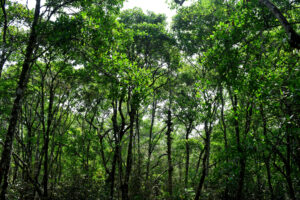Environment & Sustainability Resources

This year, the UK will host the 26th UN Climate Change Conference of the Parties (COP26) in Glasgow in early November. To help promote this, the University has put together a list of open educational resources (OERs) and free short courses relating to “Environment and Sustainability” that can be used by teachers or individuals.
Open Educational Resources
All of the OERs listed here are available on The University of Edinburgh Open.Ed TES store.
Climate Change Interdisciplinary STEM Challenge
Ages: 7-11
This interdisciplinary STEM resource on Climate Change has three to four sessions seeking out what practical steps pupils and their families can take to mitigate the effects of climate change (involves STEM challenges).
Climate Change Interdisciplinary STEM Challenge on TES
Sustainability and Conservation (Interdisciplinary Learning)
Ages: 7-11
Sustainability and Conservation is a relaxed and fun way to engage students in sustainability and conservation subjects. The topics of wildlife, nature art, habitat loss, scientific methods and waste and pollution are covered. Hands-on activities enable the learners to apply these themes to their daily lives by exploring nature. Through five workshops they will become ambassadors of conservation and sustainability and will be able to teach their family and friends about it.
Sustainability and Conservation on TES
Plastics in the Ocean (Interdisciplinary Learning)
Ages: 7-11
Over the course of four lessons, the learners are taught what plastic is, why it is bad for the environment and what can be done to address this environmental problem. As well as fun and interactive lessons, the learners are given the opportunity to explore the local area collecting litter/plastic – putting what they have learned in the classroom lessons into context in the real world.
Sustainable Schools – an IDL STEM design challenge
Ages: 7-11
This interdisciplinary approach using STEM/STE(A)M subjects involves the learners being ‘hooked’ by a plea from the head of their Council to sustainably design a new school. Ideas of fair trading and fair testing are explored in this resource.
This resource comprises five sessions, auditing your school’s current sustainable features and learning about fair trading using:
- a maths building game,
- designing and then
- making a sustainable school t-shirt (fast fashion)
- building a windmill with easy materials
- applying the fair test principle in which scenario the windmill works better.
Sustainable Schools – an IDL STEM design challenge on TES
Fertilisers in Food Production (Interdisciplinary Learning)
Ages: 7-11
This project covers both the life cycle of plants and where food comes from. The project involves growing baked beans ingredients and includes different recipes for having a baked bean “bake-off”. This resource contains a class workbook and a practitioner’s guide.
Fertilisers in Food Production on TES
Kind Clothing: Sustainable Fashion (Interdisciplinary Learning)
Ages: 10-14
Kind Clothing is a project written for Girlguides, designed by Hannah Fieldsend. It aims to fit into the exciting and varied programme suited to inspire and challenge Girlguides ages 10-14. Any groups looking to achieve their ‘Global Awareness’ guiding essential can use Kind Clothing as part of their programme, and it covers topics such as sustainability, environmental issues and practical skills. These activities could also be adapted for use in a different context outside of Girlguides.
Kind Clothing: Sustainable Fashion on TES
Climate Change Game
Ages: 11-14
A card game to develop HOTS (Higher Order Thinking Skills) using climate change in the Alps. Learners discuss whether a fictional ski instructor should exchange his skis for bicycle wheels. Included in this guide is ‘Meet the Scientists’, about real climate scientists.
Food Production and Insects (Interdisciplinary Learning)
Ages: 14-16
This resource is a set of 5 lesson plans with slides, an experiment (with worksheets for analysing the results) and assessment items. The lessons presented here are based around a project designed to test the food conversion efficiency and water footprint of mealworms.
Food Production and Insects on TES
Meteorological Visibility Observations: A User’s Guide
Ages: 14-18
The aim of the project is to investigate specific aspects of how global climate change affects the climate of Britain.
There are two main aims to this project:
- Conduct visibility observations from Blackford Hill in Edinburgh (or other locations with a suitable vantage point), observing to see whether, in times of anti-cyclonic weather, pollution build up in the atmosphere reduces the observed visibility.
- Analysis of historical climate models to see how the frequency of anti-cyclones over the UK has changed due to anthropogenic climate change.
This guide provides the procedure and the Blackford Hill example of visibility observation conducted.
This element of the project is transferable to other locations with a suitable vantage point. The work can be carried out by a class group or as part of a specific scientific project for senior pupils.
Meteorological Visibility Observations: A User’s Guide on TES
Sea Level and Climate Change
Ages: 16+
An eight-part project about sea-level change since the ice age. It covers glaciation, global warming and isostasy. Includes lesson plans, presentations, workbooks and a template for a timeline poster to illustrate the content of the eight sessions.
Sea Level and Climate Change on TES

Image ‘Green Life’ by Awal Leemon from Wikimedia Commons, licensed under the Creative Commons Attribution-Share Alike 4.0 International license (CC BY-SA 4.0)
Free Short Online Courses
Climate Change: Carbon Capture and Storage
Explore the technology that can provide a long-term solution to protect our atmosphere from an excess of carbon dioxide, in the context of global energy, our use of fossil fuels and climate change.
Climate Change: Carbon Capture and Storage course on edX
Nitrogen: A Global Challenge
Learn about the global nitrogen challenge, how nitrogen has helped the human civilization to develop and how its misuse now threatens us.
Nitrogen: A Global Challenge course on edX
This course is also available in the following languages on edX:
Sustainable Global Food Systems
How do we feed 11 billion people? Discover the importance of sustainable food systems on a global scale.
Sustainable Global Food Systems on edX
Climate Solutions
We are in a Climate Emergency. The actions we all choose to take over the next decade will decide whether we succeed or fail to meet the biggest challenge to our civilisation in the 21st century. Learn how you can help tackle climate change.
Climate Solutions course on edX
Header image: ‘Beautiful river view’ by Thirdhakshar from Wikimedia Commons is licensed under the Creative Commons Attribution-ShareAlike 4.0 International license (CC BY-SA 4.0),


